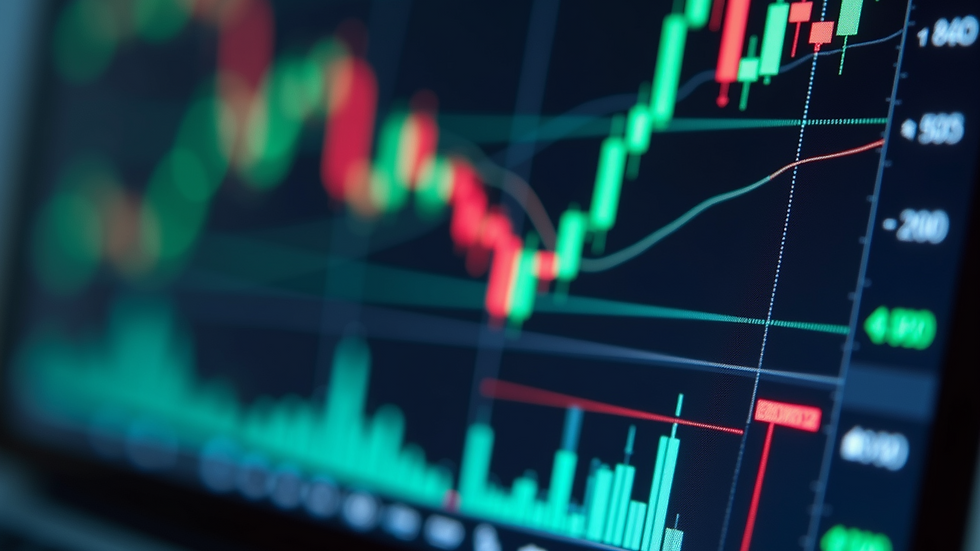Bitcoin, Network States, and Government Control: What Traders Need to Know
- forex368

- Jul 11
- 4 min read
As global markets face uncertainty, particularly in the lead-up to the U.S. elections, political instability is becoming a concern. While some view this turbulence as a threat to democracy, others see it as an opportunity for innovation.
Among them are tech entrepreneurs and crypto enthusiasts who dream of a future governed by decentralized technology—where governments no longer hold the reins. In this brave new world, Bitcoin and cryptocurrencies play a pivotal role.
For CFD traders, this rapidly evolving landscape presents both risk and opportunity. In this blog, we’ll explore how Bitcoin’s rise, wavering government policies, and radical ideas like network states are reshaping the market—and what it all means for your next trade.
Bitcoin’s Role in Trading: High Volatility, High Rewards
Bitcoin has quickly become the poster child of decentralized finance. Unlike traditional currencies, Bitcoin operates without central bank control, making it attractive to those who value financial independence.
For CFD traders, Bitcoin’s decentralized nature translates into extreme volatility—price swings far beyond those seen in more traditional assets. This volatility offers the potential for high-reward trades, but with it comes increased risk.
Trading Tip:
Bitcoin’s price movements often react strongly to regulatory news. When governments hint at restrictions or adoption, prices can surge or plunge.
Using CFDs allows traders to take advantage of these swings without holding the actual asset, which can be especially useful in such volatile environments.
Governments Wavering on Crypto: What It Means for Traders
Governments worldwide remain divided on how to handle cryptocurrencies like Bitcoin. In El Salvador, Bitcoin is celebrated as legal tender, while China has banned crypto trading altogether.
The U.S. takes a more cautious stance, with regulators like the SEC focusing on creating a framework for the market, though uncertainty lingers.
For CFD traders, these regulatory developments are crucial.
A government’s decision to regulate or ban Bitcoin can trigger sharp price movements, offering trading opportunities for those prepared to act quickly. On the other hand, new regulations could limit access to crypto markets or even increase costs for retail traders.
Key Insight:
Always keep an eye on regulatory news.
Markets often overreact to government announcements, causing price surges or drops. Trading Bitcoin CFDs allows you to stay nimble, taking advantage of short-term moves without the risks of directly holding crypto.
Network States: A New Frontier or Speculative Fantasy?
As Bitcoin evolves, so does the broader dream of network states—digital nations governed by shared values rather than geography.
Crypto advocates, led by figures like Balaji Srinivasan, envision a world where individuals choose their citizenship as easily as they switch broadband providers. These digital states, built on blockchain technology, could bypass traditional governments, offering new types of economies and currencies.
For traders, this idea may seem speculative, but it could signal a new wave of digital assets. If network states become more than a tech utopia, they could bring about new markets, cryptocurrencies, and financial instruments—offering a host of new trading opportunities.
Key Insight:While network states are still in their infancy, keep an eye on emerging crypto assets linked to these movements.
They could provide diversification opportunities, especially as traditional markets face increasing regulation.
Governments’ Uneasy Relationship with Crypto
Why do governments waver on cryptocurrency regulation? The answer lies in the tension between innovation and control.
Cryptocurrencies like Bitcoin are designed to operate outside of centralized control, which makes them appealing to investors seeking independence from government oversight. However, this very feature poses risks to national economies and tax systems, prompting many governments to regulate or outright ban crypto activities.
Some nations view cryptos as an opportunity for economic growth. They embrace blockchain technology for its transparency and potential to enhance financial systems. Others fear that unregulated markets will lead to tax evasion, fraud, and economic instability.
For CFD traders, this ongoing battle is a double-edged sword. While stricter regulation might limit direct market access, it could also stabilize the market, offering better trading conditions.
Key Insight:Monitor global regulatory trends.
A country’s decision to ban or embrace Bitcoin can create price volatility, and these moves provide rich trading opportunities for CFD traders.
The Dreamers: Tech Bros and Bitcoin Utopias
The world of crypto is filled with big dreamers—tech entrepreneurs and venture capitalists who believe that Bitcoin and blockchain technology will eventually replace traditional governments.
Figures like Balaji Srinivasan are promoting the concept of network states, where small communities governed by blockchain form digital nations. These visionaries see Bitcoin not just as a currency, but as the cornerstone of a decentralized future where individuals control their own destinies.
For retail traders, these ideas are both fascinating and potentially lucrative. If network states gain traction, they could lead to the creation of new crypto assets and financial systems that would further diversify the trading landscape.
Key Insight:As new crypto-based assets emerge, stay informed and ready to act. Trading CFDs on these emerging assets allows you to profit from market movements without committing to long-term investment in speculative projects.
Conclusion: A Brave New World for CFD Traders
The rise of Bitcoin, government wavering on regulation, and radical ideas like network states are shaping the future of global markets.
For CFD traders, this is both a time of uncertainty and great opportunity. As governments struggle to control crypto markets, and tech entrepreneurs push for a decentralized future, Bitcoin’s volatility will continue to offer exciting trading possibilities.
Understanding these shifts and adapting your trading strategy is crucial. Keep an eye on regulatory news, be prepared for price volatility, and stay open to new crypto assets that may emerge from the network state movement.
With the right approach, you can navigate these turbulent waters and capitalize on the next big trading opportunity.





